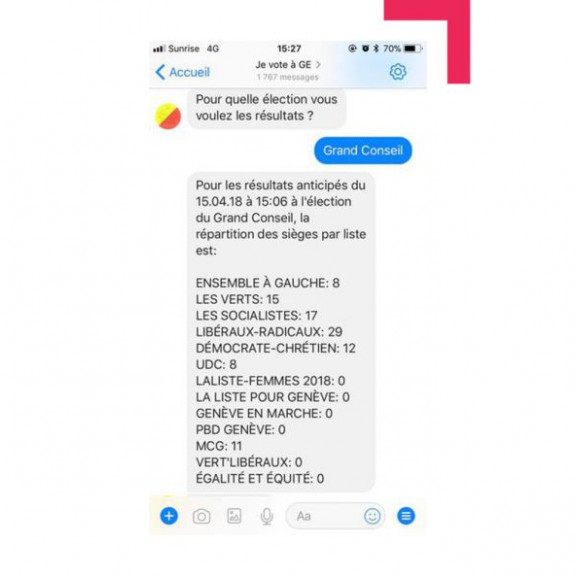STATE OF GENEVA
A chatbot that gives election results
Providing high-quality technology services to the citizens of Geneva is the aim of the State of Geneva and its Geneva Lab.

By 2017, chatbots had already entered our lives, as Christopher Larraz, Digital Technology & Innovation Advisor, and Gilles Barthelet, Cross-Disciplinary Solutions & e-Services Programme Manager, know only too well.
So, they looked into the issue, with assistance from Olivier Leclère, the State of Geneva’s Information Organisation Advisor, and began experimenting with a Chatbot developed specially to give the results of the elections held on 15 April and 6 May 2018.
Let’s take a close look at this experiment, conducted in partnership with SQLI, Oracle and Telon, and which proved quite conclusive.
“The experiment encouraged us to continue the project”
The platform was released the day before the Council of State elections held on 15 April 2018. Though the experiment only reached a limited audience, Landmanbot achieved its objectives on the big day: answering questions that users asked on Facebook Messenger.
"We’re delighted to have collaborated with companies willing to invest in this experiment. We all learned and got to know the methods and concepts, and our project proved conclusive", underlines Christopher Larraz.
“We’d like to experiment further on bots, but in-house this time round. We’ve got several ideas for OCSIN, but we need to develop the project more and talk to the State’s different departments”, adds Gilles Barthelet.
“Working on projects like this has been very rewarding for our teams. We also know how to spend time prototyping and experimenting, which is rare in our field of business”, notes Sébastien Vaury.
Specialist support
Back in summer 2017, Olivier Leclère didn’t yet know that the chatbot he had developed on his own in his free time would form the basis for Landmanbot, the robot that gives election results on Facebook Messenger.
“They’re two parallel initiatives that came together”, explains Christopher Larraz. “At OCSIN (the Canton of Geneva’s information systems and digital technologies office), Gilles Barthelet and I took an interest in Chatbots as part of our monitoring work. We reached the conclusion that the authorities in Geneva should get ready to enter this era”, he adds.
“Focused on our aim of providing effective new services to citizens, very quickly, we heard about Olivier Leclère’s personal initiative. He was motivated, like us, so we agreed we had to do something along these lines”, he remembers.
To make this chatbot experiment a success, OCSIN required external skills in terms of both technology & innovation, but also the interface and user experience aspects.
“We had the idea of joining forces with private sector companies. The State of Geneva has already worked with SQLI for several years on business application consulting and development, based on Java and Drupal technologies. Chatbots are one of the areas they actively work on. They have also created several robot Proofs of Concept with other companies. And it’s Oracle that introduced SQLI to us as an approved Chatbot platform integrator”
Sébastien Vaury, Microsoft Centre of Excellence Business Unit Manager at SQLI Switzerland, offered Geneva Lab an original approach that convinced Olivier Leclère, Christopher Larraz and Gilles Barthelet.
As it had past experience with the Telono UX agency on other projects, it was quite natural for Geneva Lab to again call on its experts for this experiment.
Technological challenges
“With this robot, the State of Geneva wanted to reach a younger audience, offering them an innovative solution via a channel that they use every day: chat. Facebook Messenger was chosen due to its frequency of use and chatbot-friendliness”, says Alexi Gérôme, UX Consultant at Telono.
“We had tight deadlines due to the fixed election dates and had to deal with several technological constraints to create Landmanbot. Plus, just as we were developing the bot, the Facebook-Cambridge Analytica scandal blew up. So, Facebook stopped all the chatbot login approval procedures. The State of Geneva had submitted the bot developed by Olivier Leclère before the affair came to light, but not for the Oracle platform. This meant we had to implement an interface connecting the robot to the Oracle platform, so that it could easily communicate with Facebook Messenger”, explains Gilles Barthelet.
“You need to take the challenges of the bot into account: i.e. provide technology that can be used by anyone and everyone. This requires a well-trained robot and excellent conversation design”, underlines Guillaume Gravey, SQLI Digital Workplace Consultant.
”We needed to find the right balance of artificial intelligence and guidance in the conversation, to offer users a decent experience”, remembers Alexis Gérôme.
Our
